PFC Melvin Carter
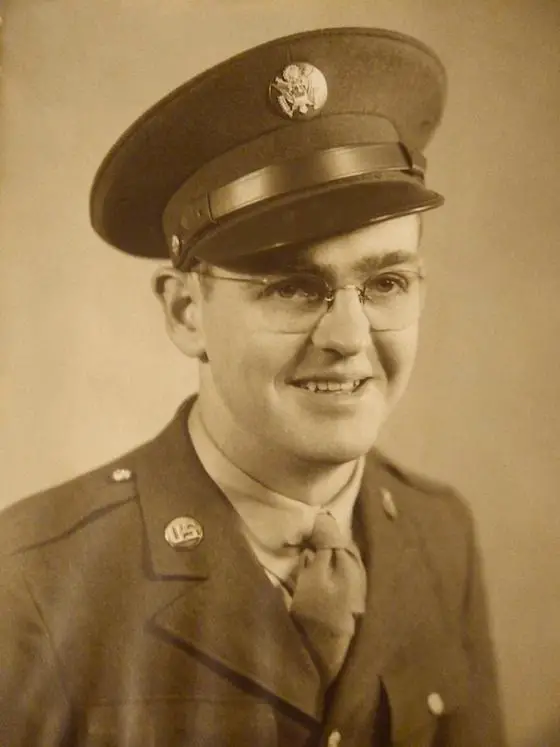
Author's Note: The following text appeared in Chapter One of the Adventures & Advice book that I wrote at the request of my youngest daughter. I also shared the book with my other two older children. This book is not available to the general public as it was a special gift to my children, my older sister, and a very small select group of my friends.
It's important to realize that my father, PFC Carter, passed away before any of my children were even a glint in my eye. The details of his life in what you're about to read are what he might have shared with my children had he been able to sit them on his lap and talk about who he was and what he did.
I only came to appreciate and deeply love my father years later after he had been worn down by life and the horrors of what he experienced in the great World War II. My mother, sister, and I sent him back to Heaven when I was a very young man.
Grandfather Melvin Carter
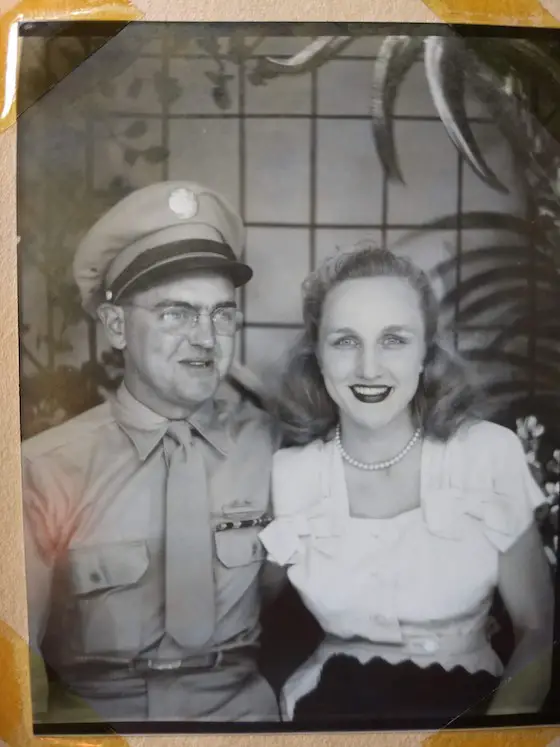
Your Grandfather Carter looks pretty smart in his US Army uniform, doesn’t he? He’s beaming because he’s sitting next to your grandmother no doubt! This photo was taken in June of 1945 after he returned from the hellish experience of World War II. The photo was taken at Coney Island amusement park in Cincinnati, Ohio. Many people went to Coney Island before Kings Island ravaged and plundered its customer base.
My dad was born on April 10, 1917. That was just four days after the USA entered World War One in Europe. His middle name honored the tiny hamlet he was born in, Mt. Vernon, Indiana. His father, William Columbus Carter was born in 1846. That made him 70 years old at the time your grandfather was conceived!
Your great-grandfather was a country veterinarian in the middle of nowhere. Mt. Vernon, Indiana is a sleepy town now, so you can imagine what it was like in the early 1900s.
I have no clue when the family relocated from Indiana to New Richmond, Ohio, just fifteen or so miles upstream on the Ohio River from downtown Cincinnati. But before ending up in New Richmond, they must have relocated to Cincinnati not too long after my dad was born because my great-grandfather is buried at the Baltimore Pike Cemetery in Cincinnati.
I do know that my dad’s mother, Ida, married three times. Ida remarried a man with the last name Steinbrecher. This is why all the urgent telegrams she received about her son during World War ll were addressed to Ida Steinbrecher. I don’t have a record of this but Ida’s second husband must have died and Ida, not wanting to be lonely, remarried a third, and final time, to Louis Nitzel. Ida passed away in 1957 and her final resting place is in Spring Grove Cemetery in Cincinnati, Ohio.
Your grandfather, his four sisters, and one older brother lived in or adjacent to a boarding house operated by his mother, Ida Steinbrecher Carter. I was five years old when my grandmother passed away. I have a dim memory of seeing her on her deathbed in a house just off Beechmont Avenue in Mt. Washington.
Your grandfather's oldest sister was my Aunt Margaret. She dated and married your grandmother’s older brother, my Uncle Louie. Your grandfather must have run into Louie at the boarding house and at some point, Uncle Louie hired him to help collect money from jukeboxes that Louie owned in local bars and other places of disrepute.
World War II started when your grandfather was twenty-one years old. He enlisted in the US Army to fight our enemies just like millions of other young men. He traveled to at least two Army camps across the US. His first training camp was Camp Pickett in Virginia where he was in Company A of the 6th Medical Training Battalion. He was trained as a battlefield medic and ambulance driver.
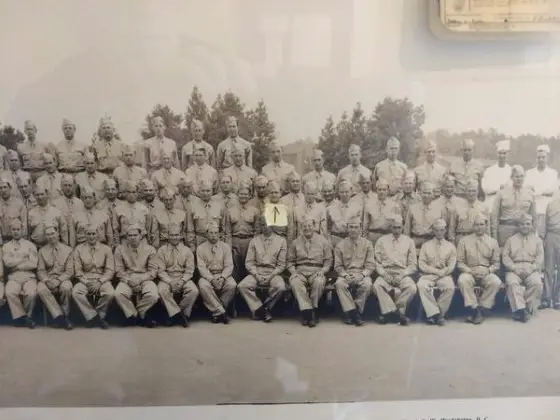
After Camp Pickett, he was sent to gorgeous Camp Carson in the Rocky Mountains of Colorado. He must have been in awe, as my guess is he’d never before seen snow-covered mountains like these.
Your grandfather was shipped to North Africa from Camp Carson on April 29, 1943. He was assigned to the Medical Detachment 180th Infantry 45th Division and became part of General Bradley’s Second Corps.
US and British troops were fighting the Germans in North Africa and it was also a staging ground for the invasion of Italy at Anzio Beach. I don’t believe your grandfather was part of the invasion force. My research leads me to believe that once the beachhead was established and the Germans were being pushed up towards Rome, his battalion landed some days after the primary invasion.
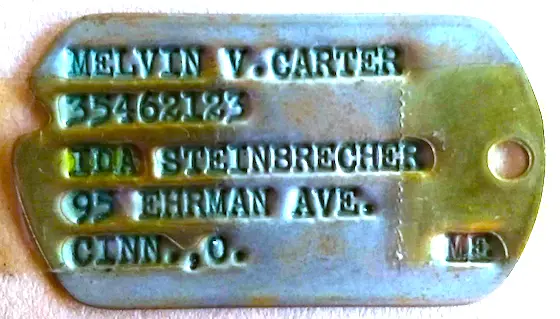
He worked his way from Anzio to Rome, and was part of the force that liberated the city of Rome from the clutches of the Nazis on June 4, 1944. Based on photos your grandfather took while in Rome, he appears to have gotten some time off while in this ancient city. However, just days later, on June 12, 1944, he was wounded in his left forearm by a Nazi bullet.
The wound was not serious and he was still able to be part of the fighting force. He also contracted malaria while in Italy. An old newspaper clipping talks about how he was recovering from it before being shipped to southern France.
I’m not clear how he made it to southern France as the Allies continued to push the Germans back towards Berlin, but on October 5, 1944, his unit was sent to the front lines. They engaged the Germans the following morning and the battle raged on all day. As sometimes happens in battle, one side can run out of ammunition. This happened to your grandfather’s unit.
The Germans captured your grandfather on October 6, 1944. I have a very dim memory of my mom saying that he could have avoided capture, but he stayed with his injured soldiers to provide aid and comfort for them.
A newspaper clipping that your grandmother saved indicated that his best friend and tentmate, Vance Hallman PFC, was able to somehow escape capture. I suspect that Vance was not sent out on patrol at the same time your grandfather was dispatched with his rifle company.
Vance subsequently wrote a letter to your grandmother dated November 8, 1944, sharing the details of the battle and your grandfather’s capture.
I’ve transcribed the actual letter here:
France
8 Nov 1944
Dear Jeane,
The letter that I’ve been waiting for came last night and it was yours of Oct 24 telling me that the War Dept had notified you of Carter being missing in action. I would have written you sooner, in fact I did write you all about it but I destroyed the letter after thinking it over and decided to wait until you had heard from the WD.
I wrote Mary all about it and told her to write you so you’ve probably heard from her by now. But in case you haven’t I’ll tell you about it and I hope this relieves you and his mother of a great part of the anxiety that you must be in.
First of all I want to tell you that Carter is only a prisoner, and I know that relieves you some because the WD never gets into detail and it’s human nature for us to expect the worst when it involves someone we love. Those three words “missing in action” cover a lot of territory and I can imagine how you all felt when you got the telegram.
Carter was an aid man with one of the rifle companies and on Oct 6 there was a big battle in the forests that (Please excuse the two kinds of paper, I didn’t know I was so near out of the other.) lasted all day and up into the night. The enemy broke through our lines and Carter’s Company was surrounded. There were many casualties so Carter and some of the men carried them into a farmhouse and down into the cellar where he could give them medical attention.
About dark that evening the enemy encircled the house and took Carter and the seventeen wounded men prisoners. Some of the other men that were at the house with Carter made a break for it and got away but Carter chose to stay and take care of his wounded buddies who might have died otherwise. Knowing Carter like I do, I don’t believe he would have left those buddies of his under any circumstances and Jeane, don’t you think any of us has forgot that heroic deed and he will certainly get recognition for it from the War Department.
I talked to one of the men that were in the house with Carter who made a break for it and got away, and he praised Carter very highly for his sacrifice. Jeane, the Germans were seen evacuating Carter and the wounded men from the house that evening with the help of five more of our medics that were captured the same time Carter was. So he has five more of his buddies in the medics that are prisoners with him.
They were litter bearers and were in a jeep on the way up to the house to get the wounded men that Carter was looking after, when they were captured.
Jeane, we’ve had reports from medic prisoners and they say the medics get the best of treatment, and they also get priority on the list of exchange prisoners which is very good news.
Yes, Jeane, I do know that you and Carter mean everything to each other and I can readily understand that, and Mary and I are looking forward to being with you all when this war is over. You’re right, we’re going to have a swell time together after this mess is all over, and I don’t think that’s so long off either. Carter and I already have a trip to the Indianapolis races and one to Florida planned.
I miss him very much, we used to lie in bed at night and talk about you and Mary and make all kinds of plans, etc. He’s a swell guy, Jeane, and I’ll be seeing more of him after this war. A fellow doesn’t find friends like Carter every day. He’s one of the best friends I ever had and I feel as if I’ve known him all my life.
Jeane, I received your other two letters sometime ago and this is the reason I haven’t answered them. I sincerely hope that I’ve taken away some of the worry off your and Carter’s mother and if there’s anything else you want to know or anything that I can do for you please don’t hesitate to call on me, I’m sure Carter would do the same for me.
Sincerely yours,
Vance Hallman
I’d love to know more about this and how terrifying it must have been. Imagine having one or more German soldiers, possibly with their bloodlust overflowing, pointing their rifles at your chest.
Another newspaper clipping recounting the battle and capture, states that he also suffered a head wound from a bullet. He was sent to Stalag II-B in Poland after his capture. This camp was located in the far northeastern corner of that occupied country. The newspaper clipping states he ate potato peels to stay alive and went without bread for weeks at a time.
He received a Purple Heart for this injury. Far greater than the gunshot wounds were the psychological injuries he suffered. These would bubble to the surface once back home and would plague your grandfather for the rest of his life.
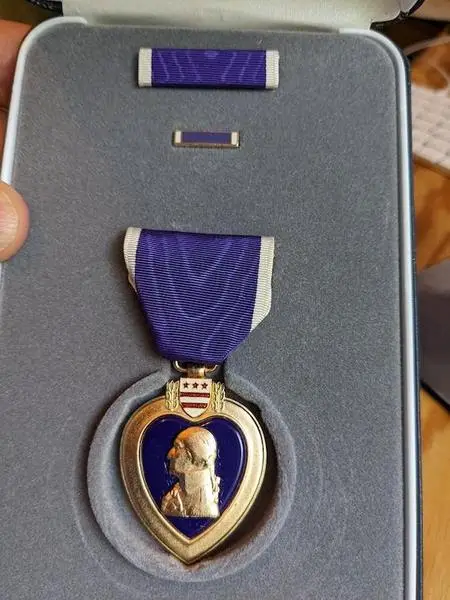
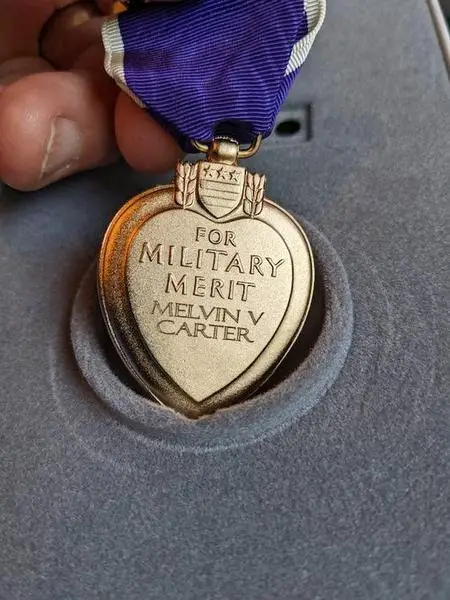
Your grandmother told me many years after your grandfather died that he had an unpleasant time in the German POW camp. He lost quite a bit of weight and I remember a story told once at the dinner table about him being hit by one of the guards. Dad had cursed at the guard out of frustration and the guard either knew English or could simply understand what my dad was trying to convey.
In April, 1945 Dad’s POW camp was liberated by advancing Russian forces that were beating the Germans back towards Berlin. Your grandfather shared the story of how on that day he and all the other prisoners awoke to find all their guards had abandoned them.
They heard a rumbling sound and a Russian tank crashed through the prison gates. Dad and all his POW buddies were fearful that they might be killed, but the tank commander opened his hatch, popped his head out, went back into the tank and brought out a 5-gallon fuel container.
The container didn’t contain gasoline. It was filled with vodka and they all had a giant liberation party right there in the POW camp!
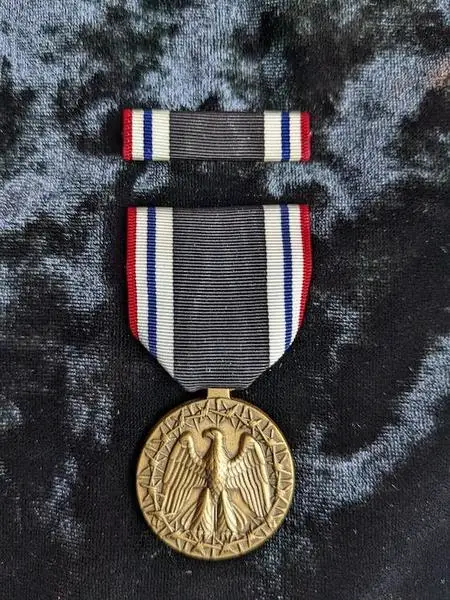
This is my dad's POW medal. Pretty somber black overtone wouldn't you say?
The war ended not too long after this and your grandfather was moved to the coast of France to await a transport ship to take him back home to his sweetheart, your grandmother. Here is the first letter he sent to her once he was liberated from the POW camp.
Germany - May 6 - 45
My Dearest Darling,
Honey just a few lines to let you know I am well and getting along fine. I know you have been waiting seven months to hear from me and I know you have thought I have been dead but when you are a prisoner you are not allowed to write much but I did write you a few letters whether you got them I don’t know.
Honey here is the main thing you want to hear right now. I am at an airport waiting for a plane to take me to the coast of France where I will (missing verb) the boat for home and I should be there within a month. Well honey right now I am very tired and sleepy so I will close until tomorrow with all my love.
Yours forever,
Melvin
He got back from Europe on June 2, 1945. He was sent to Camp Atterbury in nearby Indiana. They were married within weeks on June 14, 1945.
His experiences on the battlefield, the fear of being killed when his unit was overrun, and then the seven months in a German POW camp caused permanent debilitating injuries to your grandfather’s psyche. He suffered from severe depression that, unfortunately, was made worse by electroshock treatments administered by the Veterans hospital psychiatrists.
Doctors back in the late 1940s and 1950s thought this was the best way to treat depression, just like hundreds of years ago doctors thought that bloodletting was the way to cure sick patients.
Should you want to see disturbing and vivid examples of this electro-shock treatment, watch the movie One Flew Over The Cuckoo’s Nest with Jack Nicholson. Based on what I’ve discovered, each successive shock treatment intensified the depression so the doctors were setting up your grandfather for failure. I don’t blame them, nor should you. They were doing the best they could do at the time.
I don’t have a clear picture of the time period from 1945-1955, but my guess is it was a tumultuous time for your grandmother. She was not alone as tens of thousands of other young wives were dealing with their tormented soulmates. There’s a reason why the three-word saying war is hell rings true.
At one point, my Uncle Raymond, Aunt Thelma’s husband, got your grandfather a job at the massive Cincinnati Milling Machine factory. I have one faded memory of Dad either leaving for or coming back home from the plant. He had on dark blue pants and shirt and was carrying a metal lunchbox.
I also have a sad memory of his escalating torment. One warm summer day, he and Mom were involved in a heated discussion. It was close to my birthday and evidently, he wanted to rescind his promise of taking me and some friends on some sort of birthday outing. It might have been an afternoon at Putt-Putt miniature golf. I was quite young and I remember sitting on the front porch crying as I heard Mom’s frustrated voice. I can’t tell you how that discussion or the day turned out, but I’m sure it wasn’t the only time that things that should have been easy were instead a challenge.
It’s important to realize that back then, at least in our family, these hardships were not discussed. It might have been too painful for Mom to do. She might not have had the energy. She might not have wanted to frighten your Aunt Lynn and me any more than we already were. She might have thought that all of it was nice-to-know but not need-to-know information for our young minds.
The downside of being kept in the dark about my dad was that as I grew older, I began to resent his behavior. I couldn’t understand why he stayed home all day sleeping on the couch listening to country music over and over on the hi-fi while all my friends’ dads went to work each day.
The thought of not working was hateful to me. The animosity between us climaxed while I was in high school. I was working seven days a week at Skyline Chili. Monday through Friday, I worked from 4 until 7 p.m. to help out with the dinner rush. I’d miss dinner with the family and would bring home a pint of chili, a packet of diced onions, and a packet of cheese.
I’d eat it at the kitchen table in my favorite red-glass bowl, and Dad would come in most nights to watch me. I look back now and understand why he did this. He wanted to be with me and discover how my day had been just like how I want to hear about your days now. He’d be smoking a cigarette and the stench of it nauseated me. This just added to the dark cloud hovering over us. I so wish I could go back in time and change my behavior as it wasn’t Dad’s fault he was suffering. I was just too young to understand his pain and his own feelings of shame.
Fortunately, I began to mature as I made my way through college. The resentment faded and your grandfather and I began to become friends. I’d talk to him about what I was learning in geology and he was genuinely interested.
Once I graduated from the University of Cincinnati in June of 1974 with my geology degree, I started my own little remodeling business. Not a year passed before I had purchased my first house at 2865 Minto Avenue in East Hyde Park.
I remember one day your grandfather stopped by to watch while I worked. It was a beehive of activity and he just stood there for about an hour shaking his head in amazement at the scope of the project and what his son was doing.
Mom told me years later he was really proud of me. He knew I was tackling what for him would have been an impossible challenge.
Your grandfather’s health had always been poor. His sedentary lifestyle mixed with his heavy smoking was a recipe for nothing but bad things. When I was in grade school he had revolutionary surgery where they installed artificial arteries from just below his heart all the way down both legs. I remember crying about this in school the day of his surgery because I knew it was very serious.
In the middle of August 1976, he went for a normal doctor’s visit and the doctor listened to his heart. He was in the middle of an arrhythmia episode and the doctor told him to get to the hospital immediately.
Your grandfather didn’t last a week. He was in intensive care, had multiple heart failures, and was brought back to life with defibrillators. Your grandmother, your Aunt Lynn, and I watched one of these terrifying events happen. I’ll never forget it.
We sent your grandfather back to Heaven on August 21, 1976, while I was living in the starter home in Hyde Park. I remember your grandmother calling to tell me he had passed away. I have many regrets about your grandfather and one is not being by his side as he passed. He died alone in his hospital room and it bothers me to this day. Your grandfather was still a young man as he was only 59-years-old. His final resting place is in Spring Grove Cemetery in Cincinnati, Ohio, near the rear exit.
Not a week goes by that I don’t think about my dad. There are so many things I’ve done that I wish he could have seen. It would have been so cool to have him stop by while I was building the house in Amberley. He would have been speechless at all the carpentry involved in that huge project! I think he’d be really proud of how my life has turned out. I know he’d be proud of you!
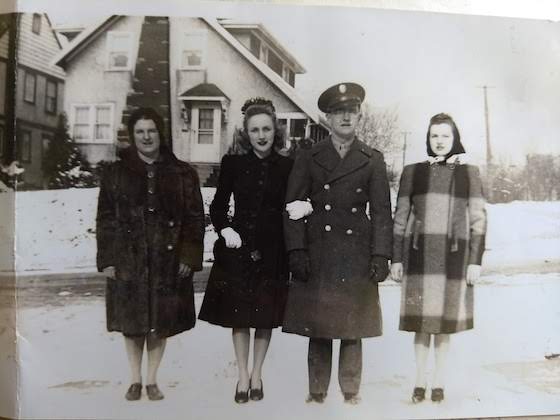
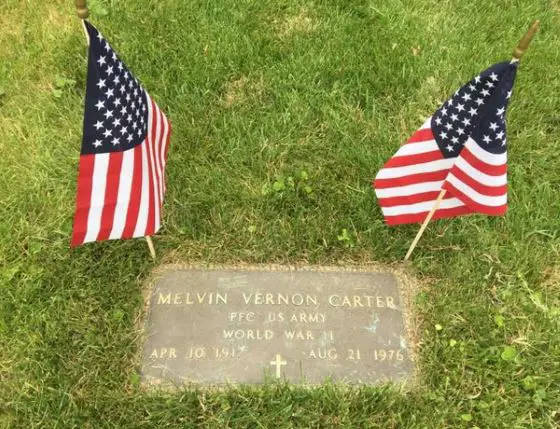
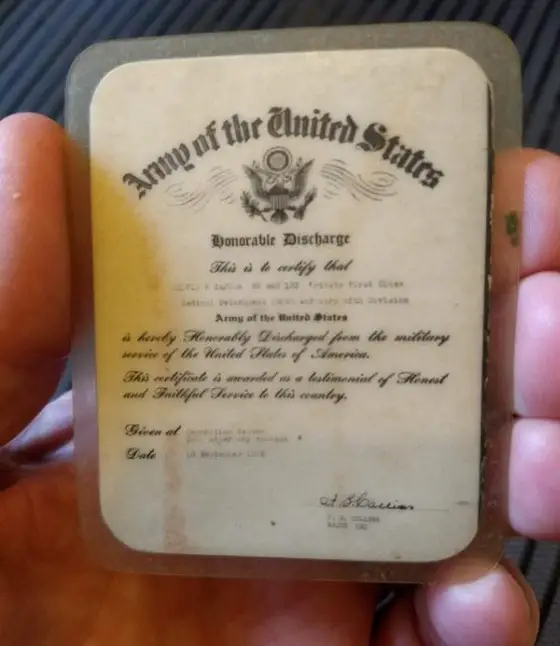
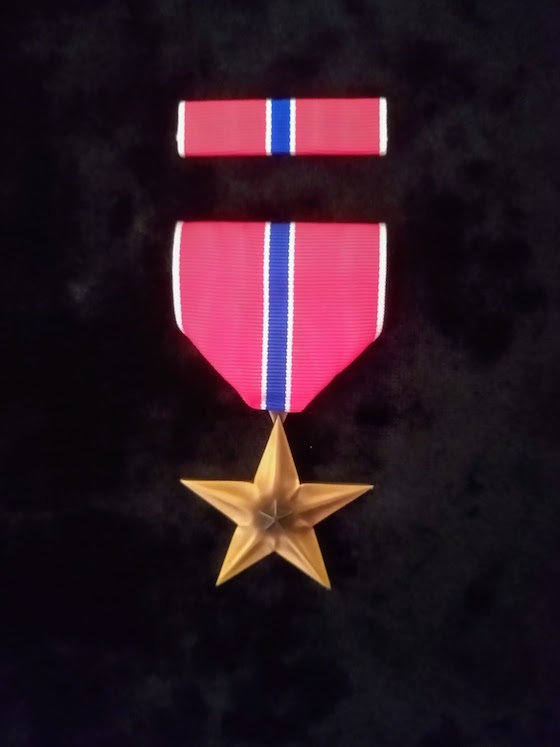
This is the bronze star Dad got for not abandoning his men in the basement of the farmhouse.
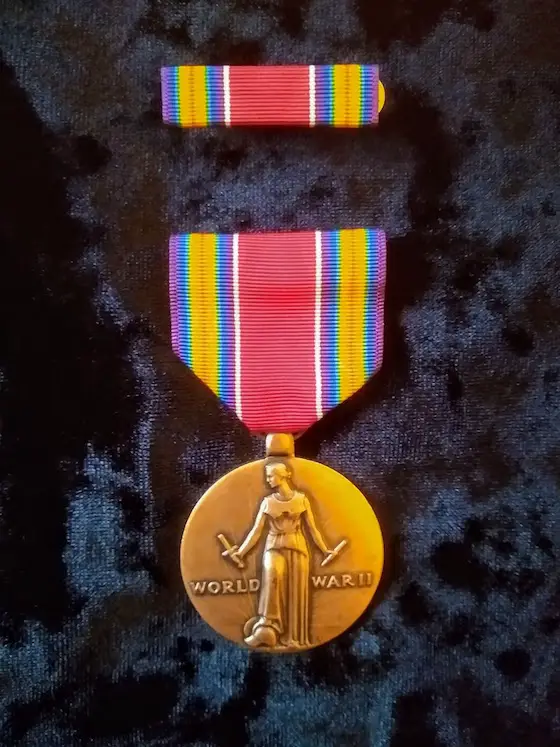
This is the WW II Victory medal I imagine all service members got once they got back home.
This column was featured in many of Tim's Newsletters.
63 Responses to PFC Melvin Carter